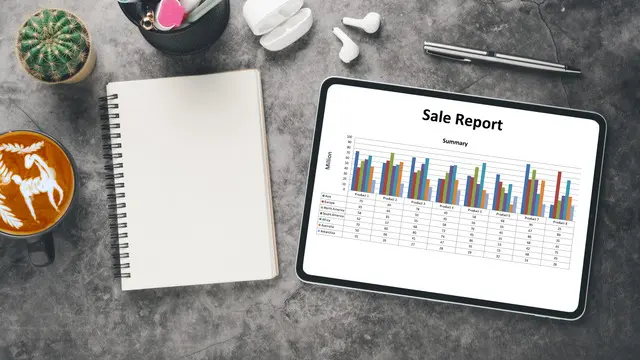Embrace the Power of Sales Reporting and Analytics Automation for Seamless Retail Success
In today’s competitive retail landscape, streamlining sales reporting and analytics automation is paramount for businesses seeking to gain a competitive edge. Manual processes lead to errors, delays, and missed opportunities. By leveraging Python, AI, and cloud-based solutions, retailers can automate these tasks, empowering them to make informed decisions based on accurate and timely insights.
With sales reporting and analytics automation, retailers can:
- Extract data seamlessly: Automatically pull data from multiple sources, including e-commerce platforms, POS systems, and CRM.
- Aggregate and analyze data efficiently: Consolidate sales data, identify trends, and generate comprehensive reports.
- Create impactful visualizations: Present data in visually appealing formats, making it easy to spot patterns and trends.
- Forecast future sales with accuracy: Leverage historical data and AI algorithms to predict future sales performance and optimize inventory levels.
Sales reporting and analytics automation is a game-changer for retailers looking to streamline operations, improve decision-making, and ultimately boost profitability. By embracing automation, businesses can unlock the full potential of their data and gain a competitive advantage in the ever-evolving retail industry.

Python, AI, and the Cloud: Supercharging Sales Reporting and Analytics Automation
Python, AI, and cloud-based solutions are the cornerstone of modern sales reporting and analytics automation. These technologies work in synergy to streamline processes, improve accuracy, and provide businesses with actionable insights.
Python’s versatility and extensive libraries make it ideal for developing both unattended and attended bots for sales reporting and analytics automation.
Unattended bots can run autonomously, performing repetitive tasks such as data extraction, aggregation, and report generation. This frees up valuable time for human analysts to focus on higher-level tasks.
Attended bots, on the other hand, can assist human users in completing tasks more efficiently. For example, an attended bot can provide real-time data analysis or help users navigate complex reporting tools.
Cloud platforms offer a comprehensive suite of features and capabilities that far surpass traditional RPA/workflow tools orchestrators. They provide:
- Scalability: Cloud platforms can easily handle large volumes of data and complex automation workflows.
- Reliability: Cloud platforms offer high levels of uptime and redundancy, ensuring that automations run smoothly.
- Security: Cloud platforms implement robust security measures to protect sensitive data.
AI plays a crucial role in enhancing the accuracy and effectiveness of sales reporting and analytics automation. AI techniques such as:
- Image recognition: Can automate the extraction of data from images, such as receipts or invoices.
- Natural language processing (NLP): Can analyze unstructured text data, such as customer reviews or social media posts, to extract insights.
- Generative AI: Can generate reports, summaries, or forecasts based on historical data and patterns.
By leveraging the power of Python, AI, and the cloud, businesses can unlock the full potential of sales reporting and analytics automation. These technologies empower retailers to make data-driven decisions, improve operational efficiency, and gain a competitive edge.

Building the Sales Reporting and Analytics Automation Engine with Python and the Cloud
Sales reporting and analytics automation involves a series of interconnected subprocesses. By leveraging Python and cloud-based solutions, businesses can automate each of these subprocesses efficiently and effectively:
1. Data Extraction:
- Use Python libraries to connect to e-commerce platforms, POS systems, and CRM.
- Extract sales data in various formats (e.g., CSV, XML, JSON).
- Store extracted data in a centralized cloud-based data warehouse.
2. Data Aggregation:
- Use Python to aggregate sales data from multiple sources.
- Clean and transform data to ensure consistency and accuracy.
- Create summarized datasets for analysis and reporting.
3. Visualization Creation:
- Use Python libraries (e.g., Matplotlib, Seaborn) to create interactive visualizations.
- Generate charts, graphs, and dashboards to present data insights clearly.
4. Trend Identification:
- Use Python’s machine learning capabilities to identify trends and patterns in sales data.
- Apply statistical techniques to detect anomalies and outliers.
5. Forecasting:
- Use Python’s forecasting models (e.g., ARIMA, SARIMA) to predict future sales performance.
- Generate forecasts based on historical data and industry trends.
Data security and compliance are paramount in the retail industry. Python and cloud platforms provide robust security features to protect sensitive sales data, including:
- Encryption at rest and in transit
- Role-based access control
- Audit trails and logging
Compared to no-code RPA/workflow tools, Python offers:
- Greater flexibility: Python is a general-purpose programming language that allows for customization and tailoring to specific business needs.
- Improved performance: Python code can be optimized for efficiency, resulting in faster automation execution.
- Lower maintenance: Python code is easier to maintain and update as business requirements evolve.
Algorythum takes a Python-based approach to sales reporting and analytics automation because we believe that it provides the best combination of flexibility, performance, and security for our clients. We have witnessed firsthand the limitations of off-the-shelf automation platforms and the dissatisfaction they can cause. By leveraging Python and the cloud, we empower our clients to build tailored, high-performance automations that meet their unique business needs.

The Future of Sales Reporting and Analytics Automation
The future of sales reporting and analytics automation is bright, with emerging technologies promising to further enhance its capabilities. Here are a few potential possibilities:
- Integration with AI-powered chatbots: Chatbots can provide real-time sales insights and recommendations to users.
- Leveraging blockchain technology: Blockchain can ensure the security and immutability of sales data.
- Adoption of low-code/no-code platforms: Low-code/no-code platforms can make automation more accessible to businesses of all sizes.
To stay ahead of the curve, we encourage readers to subscribe to our newsletter for the latest industry-specific automation insights. If you have specific custom requirements, please contact our team for a free feasibility assessment and cost estimate.
Together, let’s unlock the full potential of sales reporting and analytics automation and drive your retail business to new heights of success!

Algorythum – Your Partner in Automations and Beyond
At Algorythum, we specialize in crafting custom RPA solutions with Python, specifically tailored to your industry. We break free from the limitations of off-the-shelf tools, offering:
- A team of Automation & DevSecOps Experts: Deeply experienced in building scalable and efficient automation solutions for various businesses in all industries.
- Reduced Automation Maintenance Costs: Our code is clear, maintainable, and minimizes future upkeep expenses (up to 90% reduction compared to platforms).
- Future-Proof Solutions: You own the code, ensuring flexibility and adaptability as your processes and regulations evolve.









